I realize that I mentioned Mackinaw City as a cheaper alternative to staying on Mackinac Island. However, we didn’t actually stay there. Instead, we crossed over to St. Ignace on Michigan’s Upper Peninsula. It was a quieter town, a little further out of the way, and didn’t experience the same levels of visitor density.
Don’t get me wrong, it still catered to tourists — after all the Mystery Spot and Castle Rock beckoned nearby — but it didn’t hit the same over-the-top levels. Both are equally convenient to Mackinac Island so it’s really a matter of preference. I enjoy tranquility over activity.
It also offered another example of unusual pronunciation so prevalent to this area. The Saint part was easy enough; Ignace caused the problem. When spoken, it came out something like “Ig-niss” with an emphasis on the first syllable, like Igloo.
Mackinac Bridge
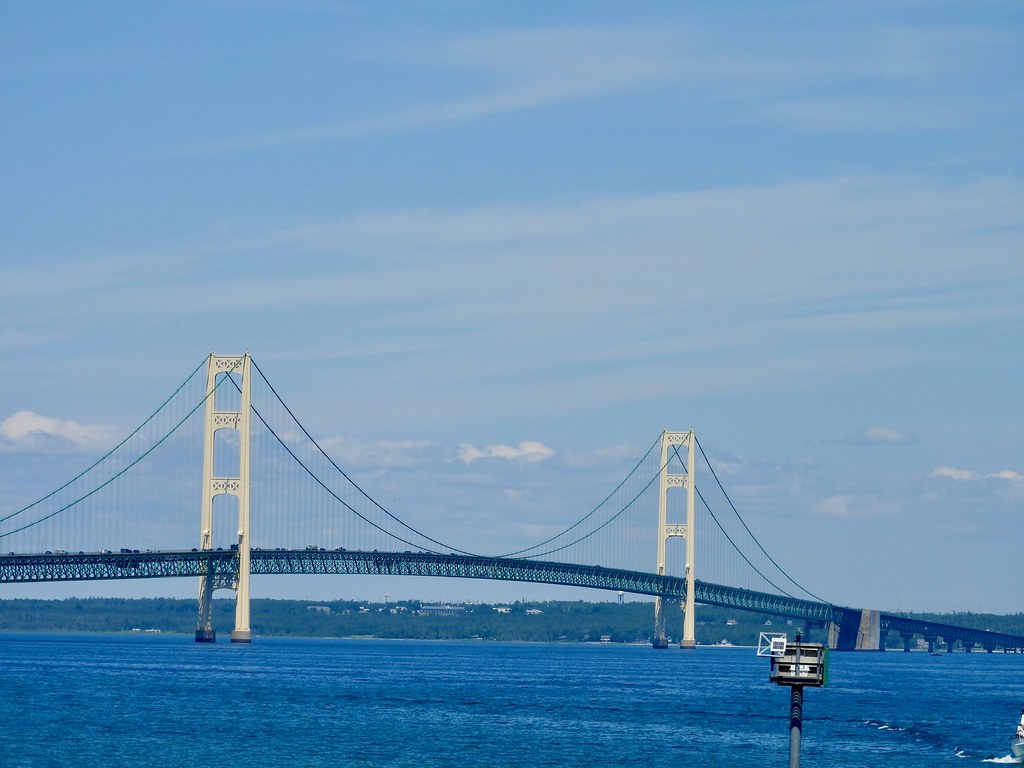
The Mackinac Bridge, the beloved “Mighty Mac” to many, connects Michigan’s Upper and Lower Peninsulas. It opened in 1957 and even now it remains the fifth longest suspension bridge in the world and the longest in the Western Hemisphere (map).
I think maybe that’s one reason why St. Ignace attracts fewer visitors than Mackinaw City. Both have ferries to Mackinac Island, and St. Ignace might even be a little bit closer. Yet, fewer people seem to use it as a home base for touring the area. Maybe it’s gephyrophobia, maybe they don’t want to pay the bridge toll, maybe it’s a psychological barrier triggered by the Straights of Mackinac. I don’t know. But the bulk of people arriving from Lower Peninsula cities seem to stop in Mackinaw City, just short of the bridge.
We didn’t have any of those issues. I drove across the bridge a bunch of times and rather enjoyed it.
Coast Guard Station
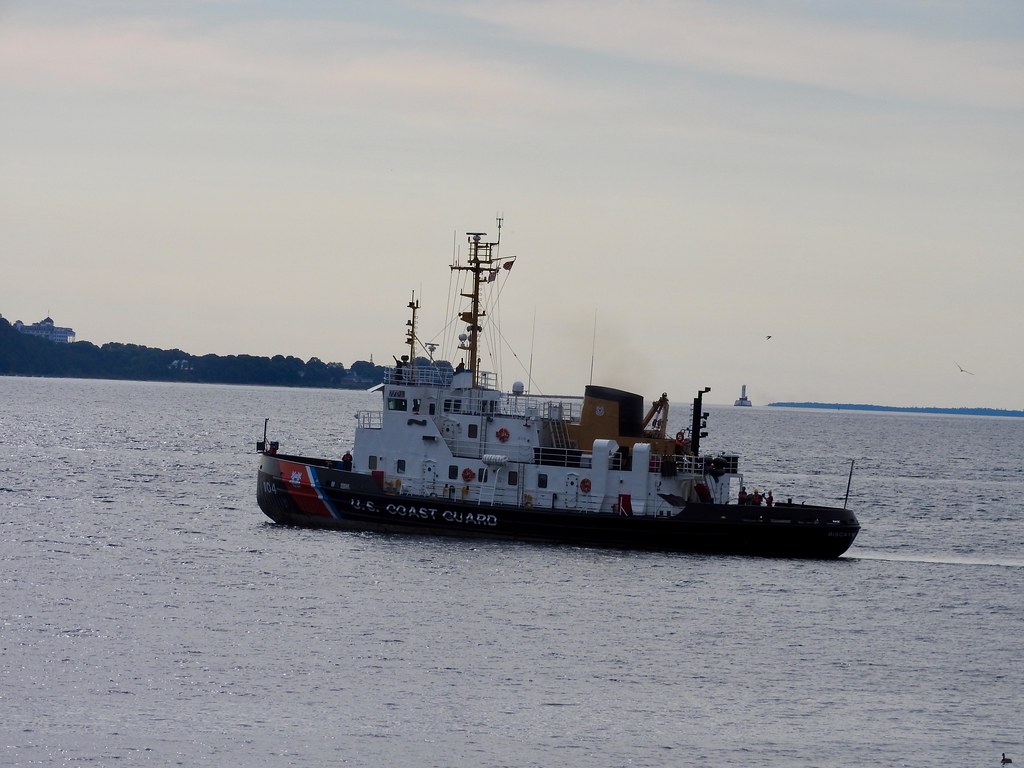
We rented a house for the week in St. Ignace directly along the shores of Lake Huron, out near the Coast Guard station (map). It probably cost about the same as three or four nights on a Mackinac Island, and we got an entire house. I’ll gladly hop on a fifteen minute ferry ride and day-trip to the island instead for those kind of savings.
The Coast Guard station seemed pretty sleepy. Occasionally I could hear a loud-speaker on base bark out an order, although we were just far enough away that it was unintelligible. Then one morning I was sitting on the back deck overlooking the lake, and noticed the cutter fired-up its engine. It left port and headed out onto the lake. I took a photo, saw a number painted on its side (104) and identified it as the USCGC Biscayne Bay. No surprise, the internet says it’s an icebreaking tug based in St. Ignace.
In the photo, Mackinac Island is the landmass on the left horizon. Look really close on the far left and you’ll see a building, the famous Grand Hotel. That what we gazed upon from our rental home. We could literally see the entirety of Mackinac Island plus anything sailing back-and-forth from St. Ignace. I became very familiar with ferryboat schedules after watching ships cruise the channel all week.
State Street

I tend to wake up early, like crack-of-dawn early, and take walks before anyone gets up even when I’m on vacation. Yes, it’s peculiar but it’s my thing and it makes me happy. It also lets me explore my surroundings while avoiding human interaction, which is simply splendid for introverts. I’m not sure I’d describe St. Ignace as bustling, but it was downright dead at 6:30 on weekday mornings.
State Street is the primary business district here (map). It includes its share of tourist destinations but it also has a lot of places more locally-focused like the hardware store, post office, bank and pharmacy. I think I saw only two fudge shops so that right there made it different. No one can walk ten feet on Mackinac Island or Mackinaw City without running into a fudge shop.
Wawatam Lighthouse
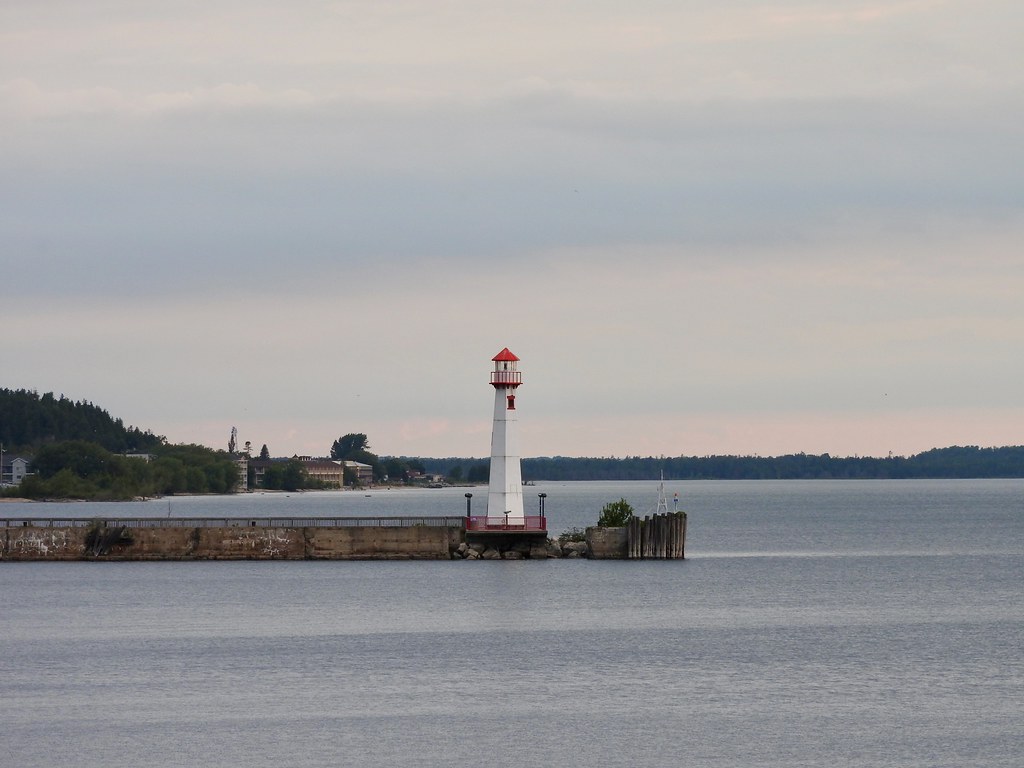
Isn’t this the cutest little lighthouse? It sits right there at the mouth of St. Ignace’s harbor and marina (map). However, and I want to be kind here, it’s fake. Well, more accurately, it used to be fake but now it’s sort-of real. I actually love that about it.
Seriously, the Wawatam Lighthouse began as a roadside decoration outside of a Michigan welcome center just over the border from Ohio, somewhere between Toledo and Detroit. It wasn’t even that old; only erected in 1988, and it certainly wasn’t functional. But a few years later the state decided to refurbish the welcome center and tear-down the “lighthouse.”
I guess St. Ignace felt a little jealous that so many other Great Lakes towns had their own signature lighthouses. Its rival across the Straits, over in Mackinaw City, even had two. Meanwhile St. Ignace had nothing. They might not actually need a lighthouse but they certainly deserved one. So they made a pitch for the fake lighthouse, refurbished it, and converted it into a functional navigational aid that came online in 2006. It actually lights up now and it’s a scenic attraction along St. Ignace’s Huron Boardwalk.
St. Anthony’s Rock
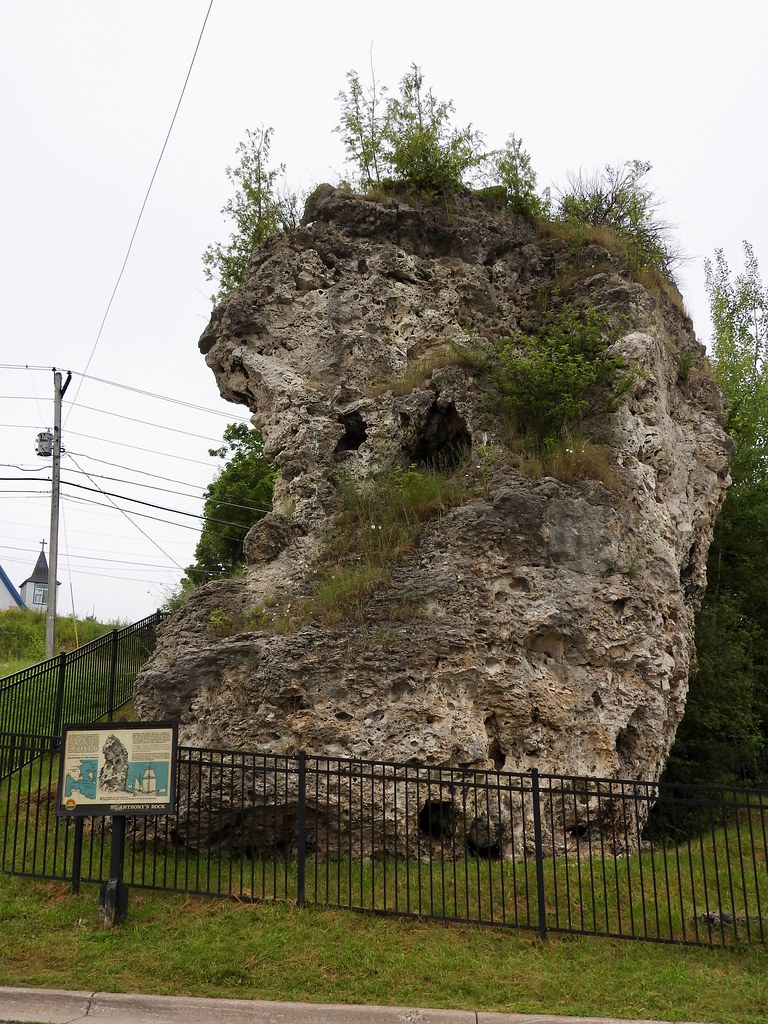
St. Anthony’s Rock is another sea stack like Castle Rock. But this one sits right in the middle of St. Ignace and it doesn’t cost anything to walk up to it (map). Supposedly it once had a staircase to the top with a bandstand where musicians played. That seemed really random. Why would anyone want to do that? First of all, it’s not that impressively tall. And second, no. Just no.
Father Marquette
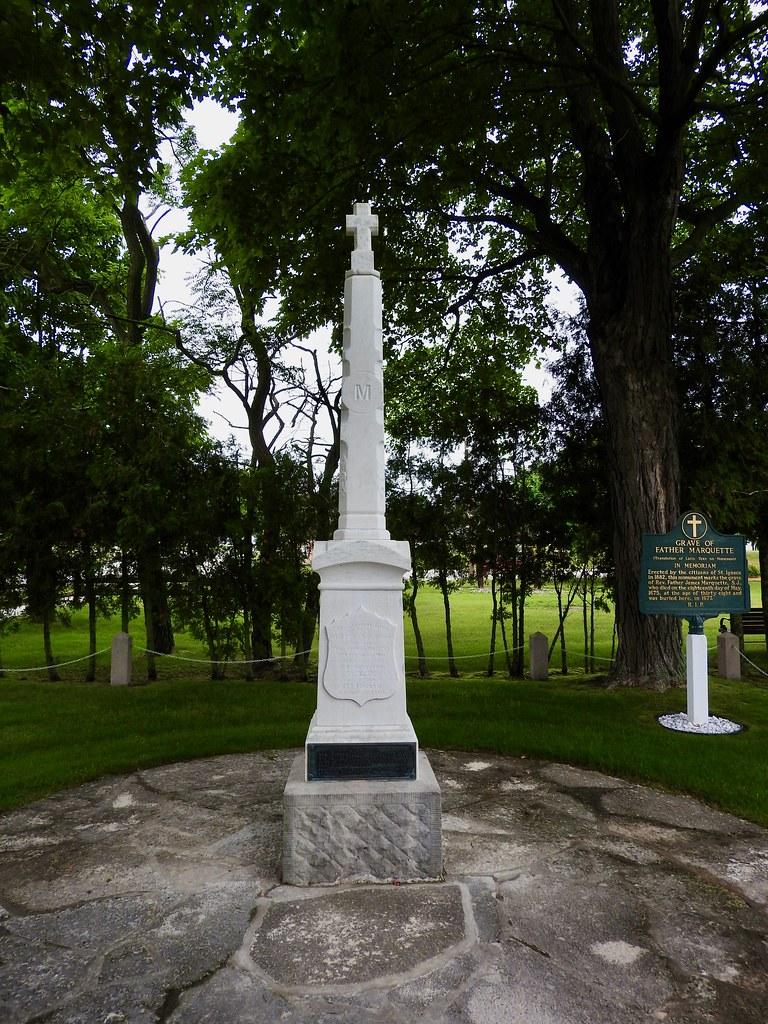
Marquette is a big-deal name throughout the Upper Midwest. There are cities, counties, rivers, parks, lakes, and even a university named for Father Marquette. There’s also the Father Marquette National Memorial just outside of St. Ignace but feel free to skip it because it’s pretty lame even though it’s affiliated with the National Park Service. But his actual burial spot is right in downtown St. Ignace next to the Museum of Ojibwa Culture, and that’s worth a stop (map).
Father (Père) Jacques Marquette was a Jesuit missionary from France, sent to proselytize to a native population in the new French territory. He helped found Sault Ste. Marie in 1668 and then built a mission in St. Ignace (named for St. Ignatius of Loyola, one of the founding Jesuits) a couple years later. Eventually he pushed deep into the Mississippi watershed as part of an expeditionary team, reaching as far south as the Arkansas River. He was on his way back to St. Ignace when he passed away from exhaustion and illness in 1675.
Cultural Paradox
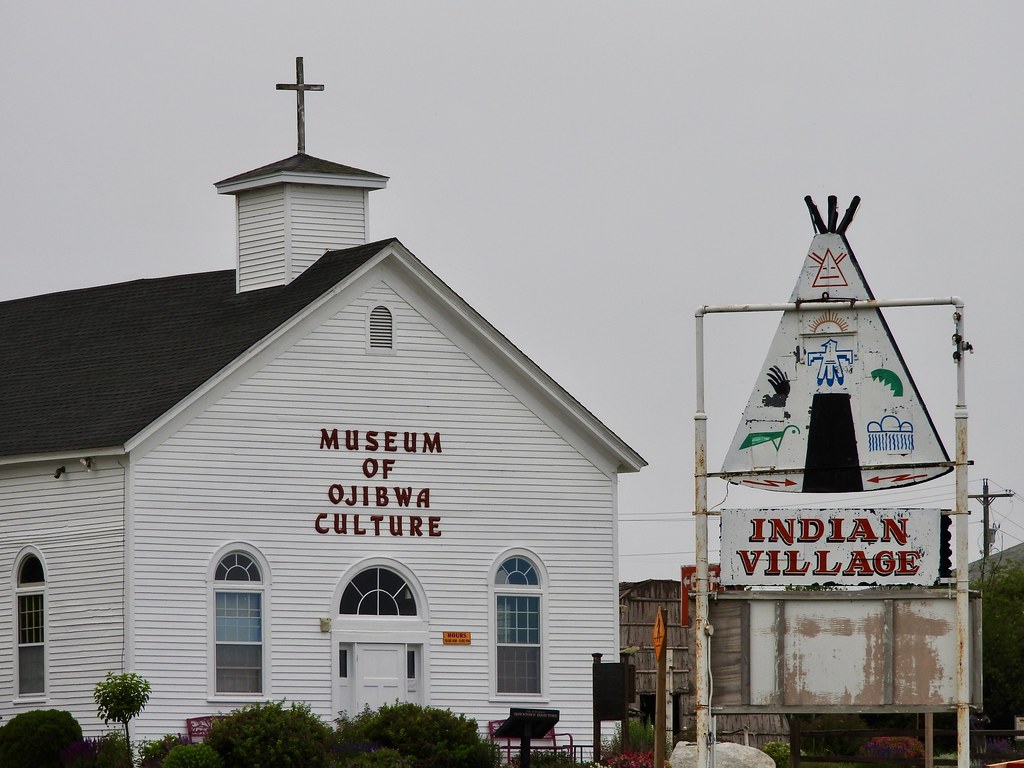
As reverently as the Museum of Ojibwa Culture treated the native heritage of this region, directly across the street stood a souvenir shop called Indian Village. Old attitudes still linger and if you want to get a photo of your face poking through a painted board that makes you look like a stereotypical “Indian” you can do that. But it still felt weirdly out of time and out of place.
Articles in the Mackinac’s Orbit Series
- Up North
- Counting Fingers
- Sault Ste. Marie
- Petoskey
- Eastern U.P.
- Mackinaw City
- St. Ignace
- Town of Mackinac Island
- Lake Shore Road
- Into the Highlands
- What’s Brewing?
See Also: The Complete Photo Album on Flickr.

Leave a Reply